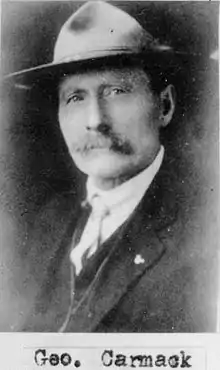George Carmack
George Washington Carmack (September 24, 1860 – June 5, 1922)[1] was an American-born prospector in the Yukon. He was originally credited with registering Discovery Claim, the discovery of gold that set off the Klondike Gold Rush on August 16, 1896. Today, historians usually give the credit to his Tagish brother-in-law, Skookum Jim Mason.
George Carmack | |
|---|---|
 Carmack c. 1900 | |
| Born | George Washington Carmack September 24, 1860 |
| Died | June 5, 1922 (aged 61) |
| Nationality | American |
| Occupation | Prospector |
| Known for | With his brother-in-law, credited with making Discovery Claim, the gold discovery that led to the Klondike Gold Rush |
| Spouse(s) | Kate Carmack Marguerite Laimee |
| Children | Graphie Grace Carmack |
| Parent(s) | August Perry Carmack, Hannah L. Stiles |
| Relatives | Sister, Rose Watson |
Early years
Carmack's mother died when he was 8 years old and his father when he was 11. His great-grandfather was Abraham Blystone. Carmack briefly served in the United States Marine Corps aboard the USS Wachusetts and in Alaska before deserting in California in 1882 when he was refused leave to visit his sick sister.[2]
Carmack returned to Alaska in 1885 to engage in trading, fishing and trapping.[3] In 1887 he made a common-law marriage to[2] a Tagish First Nation woman who went by the name of Kate.[4]
Prospector
Carmack was not popular with other miners, who nicknamed him "Squaw Man" for his association with native people and "Lyin' George" for his exaggerated claims. Nevertheless, he did find a coal deposit near what is today the village of Carmacks, Yukon which was named after him.
In August 1896, he and Kate were fishing at the mouth of the Klondike River when Skookum Jim, his nephew Dawson Charlie and another nephew found them. Prospector Robert Henderson who had been mining gold on the Indian River, just south of the Klondike, suggested that he should try out Rabbit Creek, now Bonanza Creek, where the gold discovery was made. The finding of gold made him wealthy and the Carmacks moved to a ranch near Modesto, California and lived with Carmack's sister, Rose Watson (Rose Curtis).
Later years
In 1900, he abandoned Kate, moved to Seattle, and married Marguerite P. Laimee in Olympia, Washington. They settled into a twelve-room white frame house in Seattle with a garage in the back. Marguerite was a good business woman, and she directed her husband's money into real estate. He owned office buildings, apartment houses, and hotels. He grew fat, eventually weighing well over two hundred pounds. With the passing years, his fortune multiplied as well.[2]
Yet throughout his life George could not stop looking for gold. He worked several claims in California, on the western slope of the Sierra Nevadas, and in the Cascade Mountains east of Seattle. George was determined to find another mother lode and re-create the exciting moment of discovery he had experienced as a young man on Bonanza Creek. George died in 1922, at age sixty-one, while working a new claim. He is interred at Evergreen Washelli Memorial Park.
Graphie married Marguerite's brother. Together with Rose, Graphie challenged and settled out of court the appointment of Marguerite as administrator of Carmack's estate.[2]
.jpeg.webp)
See also
References
- "George Washington Carmack (1860–1922)". Find-A-Grave. Retrieved August 31, 2006.
- Guide
- Early days in the Klondike, Business. The Globe and Mail, June 10, 1922.
- SHAWW
- "Guide to the George W. Carmack Papers". lib.washington.edu. Retrieved June 5, 2008.
- "SHAAW TLÁA (Kate Carmack)". canadianmysteries.ca. Retrieved June 5, 2008.
- Blum, Howard (2011). The Floor of Heaven: A True Tale of the Last Frontier and the Yukon Gold Rush. Crown Publishers. ISBN 978-0-307-46172-8.
